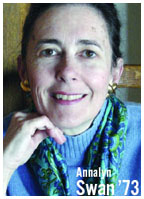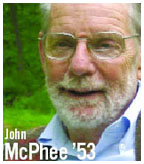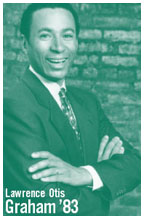
|
June 6, 2007: Features
(Photos courtesy, clockwise, from top left: The Penguin Press; Annalyn Swan ’73; George Garrett ’52; Yolanda Whitman; Lawrence Graham ’83; Verlyn Klinkenborg *82; Whitney Terrell ’91) |
Summer Reading Picks by alumni authors
For our summer reading list, PAW asked alumni authors to recommend books they recently have read.
George Garrett ’52, poet, novelist, and professor emeritus of creative writing at the University of Virginia, and the poet laureate of Virginia from 2002 to 2004.
Recommendation: Toussaint Louverture: A Biography, by Madison Smartt Bell ’79 (Pantheon). “In the opening sentence of this fascinating book, Bell writes: ‘As leader of the only successful slave revolution in recorded history, and as the founder of the only independent black state in the Western Hemisphere ever to be created by former slaves, François Toussaint Louverture can be fairly called the highest-achieving African-American hero of all time.’ Bell, a first-rate novelist, tells in this biography the incredible story of Toussaint’s Haitian Revolution (1789–1804), which engaged anxious attention in Britain, France, Spain, and the brand-new United States of America as well as from leading figures of the times — Washington, Jefferson, John Adams, and Napoleon. This is exciting reading and strongly relevant to our troubled times.”
John McPhee ’53, Ferris Professor of Journalism at Princeton and winner of the 1999 Pulitzer Prize for Annals of the Former World.
Recommendation: Oracle Bones: A Journey Between China’s Past and Present, by Peter Hessler ’92 (HarperCollins). “Oracle Bones is about Chinese people and Chinese places from Jiangsu Province to Xinjiang, and from the new city of Shenzhen to the border city of Dandong, not to mention Beijing. Through this writer’s many forms of adroitness, including spirit and humor, it carries a reader into an extremely distant context and makes the reader a part of the context. Beautifully organized, its extended landscapes and profiles are punctuated by short sections that Hessler calls artifacts, which outline the history of writing in China from ancient inscriptions carved into tortoise plastrons (known as oracle bones) on through the development of characters and what the elemental brush strokes represent.
“Hessler learned Chinese while teaching English at a teachers’ college in a small city in Sichuan Province, an experience that resulted in his first (and equally good) book, River Town. He has been The New Yorker’s correspondent in China for the past six years. Oracle Bones was nominated in 2006 for a National Book Award. It is a wondrous piece of reading.”
T.R. Reid ’66, Washington Post reporter, author of The United States of Europe: The New Superpower and the End of American Supremacy, and a Ferris Professor of Journalism last fall.
Recommendation: On Beauty, by Zadie Smith (Penguin). “We lived in London at the turn of the century. Almost every month, in those heady millennial days, the literary establishment would pronounce some bright young author to be the authentic new Voice of Britain for the 21st century. Few could live up to the hype. One who does — the one who has emerged as the best British novelist of the new century — is Zadie Smith, a precise and witty observer of contemporary life on both sides of the Atlantic. Her latest novel, On Beauty, about sexual and academic angst in Cambridge, Mass., is a charming introduction to her lucid style, her descriptive power, and her spectacular ability to capture the way people talk today. Whether it’s an ostentatiously erudite Harvard scholar, a Haitian hip-hop band in Boston, or a suburban American teenager trying to sound like an inner-city rapper, this British writer has a perfect ear for the endless varieties of American English.”
Annalyn Swan ’73, editor, writer, and co-author with her husband, Mark Stevens ’73, of the biography De Kooning: An American Master, which won a Pulitzer Prize in 2005.
Recommendation: The Inheritance of Loss, by Kiran Desai (Grove Press). “The classic tale of the immigrant — forever caught between cultures — and the family left behind is recast beautifully in The Inheritance of Loss by the young Indian writer Kiran Desai, winner of the 2006 Booker Prize. Desai chronicles the tragicomic efforts of young Biju to survive a string of jobs in the sweaty takeout joints of New York City, a world populated almost exclusively by illegal aliens. Meanwhile, back home ‘high in the northeastern Himalayas ... where India blurred into Bhutan and Sikkim,’ Biju’s father — a downtrodden cook — is besieged by parents who want help sending their children on the same fateful trip to America. In the background, insurgents gather and the last vestiges of colonial life fade away. Desai vividly evokes the many worlds of her characters, not least the magic mountains that tower above them all, impervious to poverty and politics: ‘Briefly visible above the vapor, Kanchenjunga was a far peak whittled out of ice, gathering the last of the light, a plume of snow blown high by the winds at its summit.’ ”
Lawrence Otis Graham ’83, attorney, contributing editor at Reader’s Digest, and author of The Senator and the Socialite and Member of the Club: Reflections on Life in a Racially Polarized World.
Recommendation: Redemption: The Last Battle of the Civil War, by Nicholas Lemann (Farrar, Straus and Giroux). “For readers who enjoy books about American history or race relations, I highly recommend Redemption: The Last Battle of the Civil War, which examines how the American South remade itself following its dramatic loss in the Civil War. After describing the tremendous gains that blacks made socially and politically in states like Mississippi, where newly freed blacks were elected to the U.S. Senate and House of Representa-tives during the 1865–1877 Reconstruc-tion period, Lemann focuses mostly on President Grant and on those white political leaders in Southern states who used violence and corruption to take power, money, and control from liberal whites and blacks. This era of Southern ‘redemption’ was an ugly and violent period, but Lemann, who is dean of Columbia University School of Journalism and a frequent writer for The New Yorker, expertly explains how the ‘new’ South’s political structure was cynically rebuilt through the encouragement of further racial and social divisions.”
Whitney Terrell ’91, New Letters writer-in-residence at the University of Missouri–Kansas City and author of the novel The King of Kings County.
Recommendations: Uncommon Carriers, by John McPhee ’53 (Farrar, Straus and Giroux), and The Edge of Maine, by Geoffrey Wolff ’60 (National Geographic). “In his new book, Uncommon Carriers, McPhee celebrates American commercial transportation via 18-wheeler, container ship, coal train, and even parcel post. But at its center, the author takes an idyllic digression up the waterways that Henry David Thoreau followed in A Week on the Concord and Merrimack Rivers. The route survives, hidden but unharmed, and McPhee’s trip reads like a joyous (which for McPhee means Yankee wry) thanksgiving for Thoreau’s rivers and his inspiration.
I had a similar feeling reading Wolff’s The Edge of Maine. The book, a personal travelogue of Maine, begins with a terrifying cliffhanger — Wolff lost in the fog aboard his 30-foot cutter, Blackwing, as he crosses the Gulf of Maine. But it concludes with a beautiful and fair-minded explanation of how the Kennebec River, once destroyed by sawmills and industry, was rescued by, God save us, the wisdom of the federal government. Both Wolff and McPhee are deep-draft authors, always sounding the undercurrents of American place and history. Their books read like fellow travelers to me.”
Verlyn Klinkenborg *82, member of the editorial board of The New York Times and author of The Rural Life (a collection of essays), and the novel Timothy; Or, Notes of an Abject Reptile.
Recommendation: Pages from the Goncourt Journals, by Edmond and Jules de Goncourt, foreword by Geoff Dyer, edited and translated by Robert Baldick (New York Review Books). “I think we cannot be reminded too often — or too sharply — what a different country the past was. And in these journals, the past is Paris from 1851 to 1895, Paris in the company of French brothers Edmond and Jules de Goncourt. Until 1870, when Jules died, the journal was a collaborative effort. After that, Edmond carried on alone. He described the two of them as the ‘St. John-the-Baptists of modern neurosis,’ and though he was saying this about their novels and plays, he might also have said it about the city that emerges through their eyes.
This selection — first published in 1962 and now reissued —
is endlessly interesting, whether we’re listening to Flaubert, witnessing
the effects of the siege of Paris, or attending a house-warming dinner
at Zola’s. This is the tide of life, with every now and then an
observation that seems to reach down into the present, like this one:
The Goncourts have dined next to an American woman in Rome. Later they
write about Americans, ‘These men and women were destined to be
the future conquerors of the world. They will be the Barbarians of civilization,
who will devour the Latin world as the Barbarians of barbarism devoured
it in the past.’” ![]()







